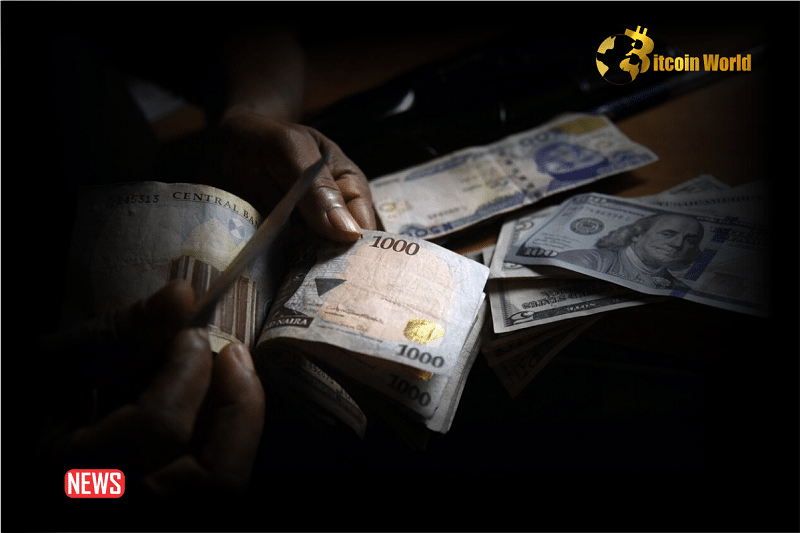The Nigerian Naira has recently experienced a significant downturn, hitting a new record low against the US dollar. On January 25th, the official exchange rate saw the Naira plummet to ₦1,398 per dollar, almost mirroring the parallel market rate of ₦1,400. This sharp depreciation has sparked concerns across Nigeria and beyond, raising questions about the stability of the nation’s economy. What’s driving this dramatic fall, and what steps are being taken to address it? Let’s dive into the details.
Nigeria’s Naira in Freefall: A Deep Dive
The current turmoil in the Naira’s value can be traced back to a period of significant transition in Nigeria’s leadership. Following the inauguration of President Bola Tinubu and the subsequent removal of Godwin Emefiele as the Governor of the Central Bank of Nigeria (CBN), the Naira’s trajectory shifted downwards.
Under Emefiele’s governorship, the CBN maintained a relatively fixed exchange rate, pegging the Naira just under ₦500 to $1. This policy, while aiming for stability, faced criticism for creating artificial scarcity and pressure in the unofficial markets. However, since the leadership change at the CBN, the Naira has been on a consistent downward slide in both official and unofficial markets.
Why is the Naira Plummeting?
Economic experts point to a key factor fueling this depreciation: persistent foreign exchange (forex) shortages. Nigeria, heavily reliant on imports, requires a steady supply of foreign currency, primarily US dollars, to facilitate international trade. When this supply dwindles, demand outstrips availability, pushing the price of forex upwards – and consequently, devaluing the Naira.
Here’s a simplified breakdown of the situation:
- Demand vs. Supply: Nigeria’s demand for USD for imports and international transactions is high, but the supply isn’t keeping pace.
- Forex Scarcity: Limited forex reserves mean banks and businesses struggle to access the dollars they need.
- Market Reaction: Scarcity drives up the price of USD, making the Naira weaker in comparison.
Cardoso’s Optimistic Outlook Amidst the Naira’s Struggles
Despite the concerning depreciation, the current CBN Governor, Olayemi Cardoso, presents a different perspective. During the launch of a recent economic outlook report, Cardoso boldly stated that the Naira is currently “undervalued.” This assertion suggests that the CBN believes the Naira’s true worth is higher than its current market value.
CBN’s Strategy: Coordinated Measures for Naira Recovery
To address the Naira’s depreciation and realize its perceived true value, Cardoso emphasized coordinated fiscal and monetary policy measures. The CBN’s strategy is focused on achieving genuine price discovery in the foreign exchange market, aiming for a more balanced and stable exchange rate in the near future.
Key elements of the CBN’s approach reportedly include:
- Centralizing Forex Inflows: The CBN is exploring measures to ensure that all foreign exchange earnings are channeled back to the central bank. This aims to boost forex reserves and improve supply.
- Fiscal Policy Alignment: Coordination with the government’s fiscal policies to manage demand and strengthen the economy’s fundamentals.
- Market Reforms: Ongoing reforms within the CBN are intended to create a more transparent and efficient foreign exchange market.
Cardoso’s optimism hinges on the belief that these reforms will ultimately lead to a consistent and stable exchange rate. This stability, in turn, is projected to boost investor confidence, making Nigeria a more attractive destination for foreign direct investment (FDI). Increased FDI is crucial for long-term economic growth and strengthening the Naira.
See Also: Central Bank Of Nigeria (CBN) Sets Out New Rules For Cryptocurrency Trading
Challenges and the Road Ahead
The Naira’s situation highlights the complexities of managing currency values, particularly during economic and political transitions. Restoring stability is not a simple task and requires a multi-pronged approach. The effectiveness of the CBN’s measures will be critical in determining the Naira’s future trajectory and its impact on the Nigerian economy.
Challenges to consider:
- Global Economic Factors: External economic pressures and global market volatility can influence the Naira’s performance.
- Implementation Risks: The success of CBN’s policies depends on effective implementation and overcoming potential bureaucratic hurdles.
- Market Sentiment: Restoring market confidence and managing public perception are crucial for stabilizing the Naira.
Conclusion: Will the Naira Recover?
The recent depreciation of the Nigerian Naira is undoubtedly a cause for concern. While forex shortages are a significant contributing factor, the CBN Governor maintains that the Naira is undervalued and is implementing coordinated measures to achieve stability. The success of these efforts is paramount for Nigeria’s economic future. A stable Naira is essential to attract foreign investment, control inflation, and foster sustainable economic growth. The coming months will be crucial in observing the impact of the CBN’s reforms and whether they can indeed steer the Naira towards recovery and stability, ultimately bolstering Nigeria’s economic prospects.
Disclaimer: The information provided is not trading advice, Bitcoinworld.co.in holds no liability for any investments made based on the information provided on this page. We strongly recommend independent research and/or consultation with a qualified professional before making any investment decisions.



